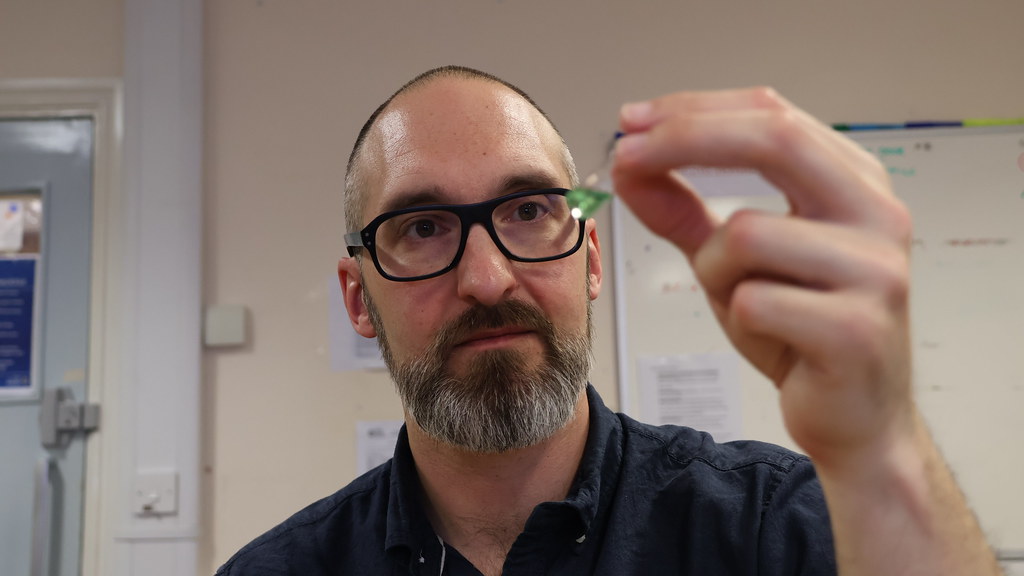New warnings about how social media is increasing the ease that teenagers can obtain illegal vapes and e-liquids containing spice, are being issued following research led by the University of Bath.
Last year Professor Chris Pudney (pictured above studying vape liquid) from the Department of Life Sciences at the University of Bath revealed the scale of vapes that were being spiked with spice and voiced his concerns about the high risks this posed for young people. The Spice is a synthetic drug that is highly addictive. It can cause a wide range of dangerous side effects, including cardiac arrest and is a high cause of death within prisons.
Now researchers from a number of universities have analysed 1,923 e-cigarettes and e-liquids, confiscated by 114 schools in the 2024/25 academic year across seven regions in England. While spice was found in 13% of samples overall, the figure rose to around 25% in two regions – London and Lancashire. The testing was carried out using the world’s first portable device that instantly detects synthetic drugs developed by an inter-disciplinary team at the University of Bath, which is now being used by many police forces when they seize illicit vapes and e-liquids.
The research paper is yet to be published but with the new school year just underway the academics were keen to share the results of their analysis so that schools and others were more aware of the risks from spice vapes and could take action to protect their students.
Professor Pudney, when the initial study of 38 schools found that 1 in 6 (16.6%) of confiscated vapes contained spice was published last year, said that he believed that young people were mistakenly obtaining spice-laced vapes believing they were THC-laced vapes.
Further research conducted between June and August 2025 of social media platforms, where vapes and e-liquids are readily available for sale, indicate that this is the case. The analysis identified 120 TikTok accounts and 83 Instagram accounts apparently offering ‘THC’ e-liquids for sale – despite THC, the psychoactive component of cannabis, being a controlled substance, whose advertisement is illegal.
Having had extensive lab experience analysing vapes and e-liquids from schools, the researchers were able to identify spice-containing e-liquids with 96% accuracy by visually triaging the online images. Visual analysis revealed that nearly 70% of TikTok accounts and over 50% of Instagram accounts claiming to sell THC were actually selling spice.
TikTok and Meta, which owns Facebook and Instagram were alerted to the prevalence of these advertisements but, when this was rechecked at the beginning of September a significant number (around 70%) of accounts tracked by researchers were still online and easily accessible through simple keyword searches.
Professor Pudney said: “Spice e-liquids are trivially available on social media like TikTok and Instagram, with apparent drug dealing on these platforms. A simple search of social media platforms brings up hundreds of accounts selling this material, making them incredibly easy for young people to find.
“Spice is much cheaper than THC. Young people think they’re buying a cannabis product but instead they’re being pushed a highly addictive, cheap drug with unpredictable and serious health effects, such as psychosis, seizures and heart problems.”
The study’s authors are now calling for Ofcom – the UK’s media and communications regulator – to open a specific enforcement programme dedicated to online drug sales. Under the Online Safety Act, Ofcom has been given strong powers to stop the sale of illegal drugs on social media platforms.
Platforms are expected to assess the risk that their services could be used to sell or promote illegal drugs, and the regulator can issue fines of up to £18 million or 10% of a company’s global annual revenue, whichever is greater, in penalties.
Professor Pudney said: “We are calling for Ofcom to be properly resourced and directed to open a specific enforcement programme dedicated to online drug sales. “People who use spice are at high risk of coercion and abuse by drug dealers. This is a failure of online safety that is causing direct harm to children.”
In the wake of this research the BBC and Sky News have interviewed teenagers that have been impacted by spice-laced vapes.
Meanwhile, ongoing work by Trading Standards Officers in Scotland testing sellers of tobacco and nicotine vaping products (vapes) has found that 1 in 7 premises visited sold cigarettes, and 1 in 5 sold vapes to an under 18 volunteer.
The Society of Chief Officers of Trading Standards in Scotland said these are significantly worse results than expected and may in large part be caused by the child appealing nature of vapes, and their wide availability in shops and service premises.
With continuing concerns about the prevalence of vaping among young people and the dangers it poses to them we offer schools and colleges the HALO Smart Sensor which can support them to tackle vaping among their students.
Our customers, such as St Joseph’s Roman Catholic High School in Bolton and Baxter College in Kidderminster, have chosen to take action after pupils have disrupted lessons by needing to leave to vape in school toilets, and when students have become unwell from vaping. If you want to find out more about how this device could help to curb vaping among young people, please get in touch.



